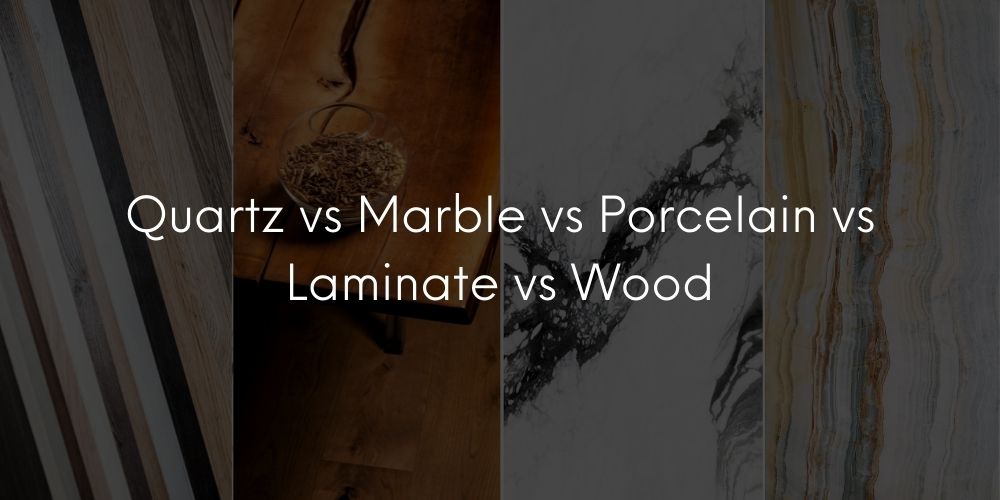Featured Factors of Countertop Materials
The first category of evaluation is the materials’ intrinsic quality which includes Hardness & Durability, Non-Porous Characteristic, Heat Resistance, UV Resistance, and Thickness & Relative Weight among six materials, including Granite, Marble, Laminate, Wood, Quartz, and Porcelain Countertops, which have been widely used in recent years.
These five characteristics are features that inherently originate from the composing elements of each material produced in a factory or from the nature of being made by the mother of nature.
- Hardness & Durability
- Non-Porous Characteristic
- Heat Resistance
- UV Resistance (Sunlight Resistance)
- Thickness and Relative Weight
Hardness & Durability in Countertops
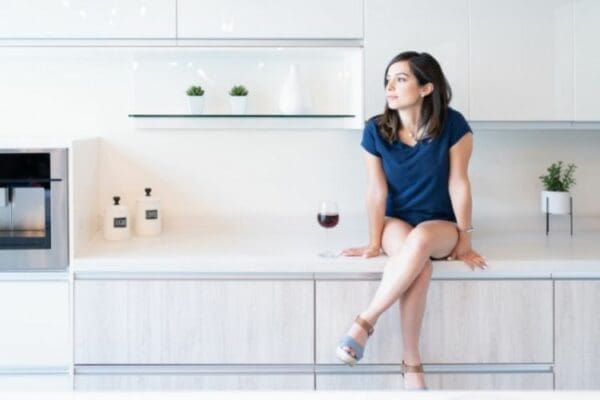
Hardness defines the material’s overall durability against things that it might encounter over time. It is a crucial feature because it leads to different features such as scratch resistance and etching resistance of the material.
Wood: The softest, with probable dents and scratches, but with the possibility of being resurfaced
Wood is the softest material on the list, and this is predictable due to the nature of wood. Although wooden countertops can have a long life because you can resurface them multiple times, there are usually more probable dents and scratches on the wooden surface compared to the other materials.
Check this article by prudentreviews.com: 23 Pros and Cons of Wood Countertops
Laminate: Has a long useful life with regular care, still, there may be delamination over time
Laminate countertops can be subject to delamination over time, mostly due to water seeping through seams (Laminate Countertop Review: Pros and Cons by thespruce.com). Laminate countertops have a shorter lift than natural stones, quartz, and porcelain countertops.
Marble: Relative less durability, still has a long life if it has regular maintenance
Marble countertops compared to other highly durable materials like granite, quartz, and porcelain countertops, have less durability, and require more maintenance, although, if you keep them properly maintained, they can stay in your kitchen until you want to change them.
Granite: More durability than marble
Granite is a more durable slab compared to marble stone for your countertop, due to its hardness among the stone alternatives.
Quartz: More durability than granite & marble
Quartz countertops are even more durable, which won’t crack, scratch, or get chipped easily. Based on the “Mohs Scale of mineral hardness”, if we consider the hardness of Diamond as 10, Quartz rated 7 out of ten.
Of course, just because quartz is durable doesn’t mean it’s indestructible. It’s possible to scratch or chip quartz but, due to its hard composition, the chances of damage occurring from regular, everyday use are minimal.
Porcelain: Much stronger than granite and marble
Porcelain slabs are at least more than 30% stronger than granite and marble slabs due to the high temperature in the furnace, and the best quality of porcelain slabs are stronger than granite up to 200%, which makes the porcelain countertops the best resistant to chipping, scratches, and cracks.
Nevertheless, you should know that despite porcelain countertops being definitely durable, they’re not indestructible. That said, due to the hardness of the porcelain countertops, their durability is outstanding, and they can last a lifetime in your house.
You can find more detail by checking our porcelain slab products.
Non-Porous Characteristic in Countertops
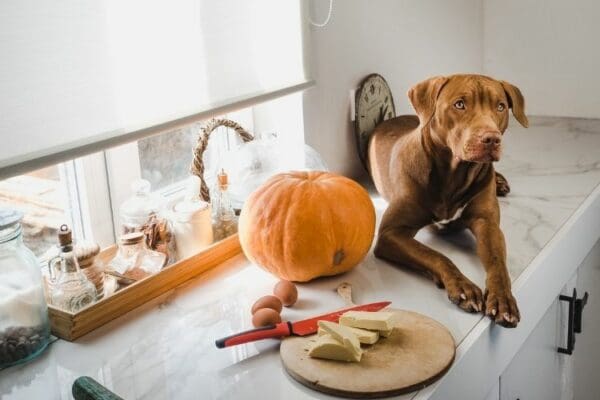
In this section, we assess the porosity and permeability of each material. Non-porous surfaces are sealed so liquid, and air cannot move through them, which can lead to stain resistance and the degree of water absorption.
Wood & Laminate: Porous, laminate is better than wood
Due to the natural nature of wood, we cannot consider wood non-porous, although the structure of laminate is better than wood, it is still considered porous.
Marble & Granite: Considered porous, but they turn non-porous with sealing
Although natural stones convey a great feeling to us because of their natural origin, they have microscopic pores throughout themselves, and it brings more necessary care and maintenance.
In other words, the porous surface of natural stones allows liquids to penetrate beneath their surface, which can lead to stains, color-changing, and irreparable harm to the surface of the Marble countertop. In addition, dirt may enter the holes and hinder the surface from being completely cleaned.
Of course, if you want a natural stone countertop there are tricks to help you to better protect your stone surface more. You may seal your marble countertop or granite countertop to ensure juice or oil can no longer hinder the beauty and cleanliness of your granite countertop.
While the structure of marble and granite is far better than wood, still they considered as porous. Granite is far better than marble, however, if you seal them properly, it will reduce the disadvantages of their non-porous nature exponentially.
Quartz & Porcelain: Non-porous surface
Although, when a granite countertop has been sealed properly, it’s almost as good as quartz, the sealing will break down over time and it returns the stone countertop into its previous condition which allows liquids to penetrate to the stone.
Unlike natural stones, Quartz and Porcelain countertops have been engineered to be non-porous stone-design surfaces.
Heat Resistance in Countertops
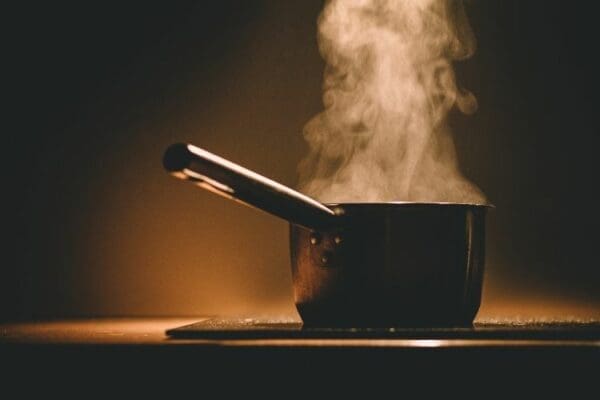
Wood: After sealing, almost heat-resistant
Once sealed, wood countertops are sanitary for chopping meat, and hot pots and pans can be placed on the wood surface because wood countertops are quite heat-resistant.
Laminate: Tolerate moderate heat for a short time
There are some types of laminate countertops that can tolerate heat up to 275 degrees for a short period of time.
Marble: Tolerate heat for short time but it may discolor or crack over time
Marble countertops can stand up to hot pans. If you put marble stone in your bathroom, hair styling tools should not cause damage while they heat on the bathroom’s countertop surface either. However, its heat resistance is not for a long time and if its surface is exposed to heat, it may discolor or crack.
Quartz: Relatively heat resistant but susceptible to heat damage by deformation and discoloration
Quartz is susceptible to heat damage, although quartz is heat resistant, the resins and polymers are not. When the quartz countertop has been exposed to high temperatures, it could melt the resins and lead to deformation and discoloration, and as a sign of heat damage, the quartz countertop gets white spots.
Granite: Heat resistant more than marble and quartz
More than quartz and marble stone, granite is heat resistant and durable, although you can put a hot pan onto your granite countertop, it’s always best to use a protective pad under the hot pans.
Porcelain: Perfect heat resistant using hot pots or induction burners on porcelain countertop, or heat tolerant above the fireplace
Porcelain slabs are created after getting a high temperature into a furnace, so it is highly resistant to hot pots and pans. Of course, it’s better after all to use hot pads.
Porcelain countertops are perfect if you would like to use a hot pot or pans on them. Porcelain countertops won’t burn, smoke, or emit harmful substances when subjected to heat. Another advantage that you can get from Porcelain Slabs’ heat resistance is that you can simply use those beautiful book match porcelain slabs above your fireplace to make a luxurious design in your house, without worrying about your stone being damaged by the heat of the fireplace.
Furthermore, new innovative models of stoves have began offering integrated induction burners using porcelain countertops. These can be custom placed in the specific areas of your countertops, installed under your porcelain countertop where you want to cook, creating the sleekest cooking surface imaginable.
Related article:
Why you might want porcelain slab countertops? published by Forbes.
UV Resistance (Sunlight Resistance)
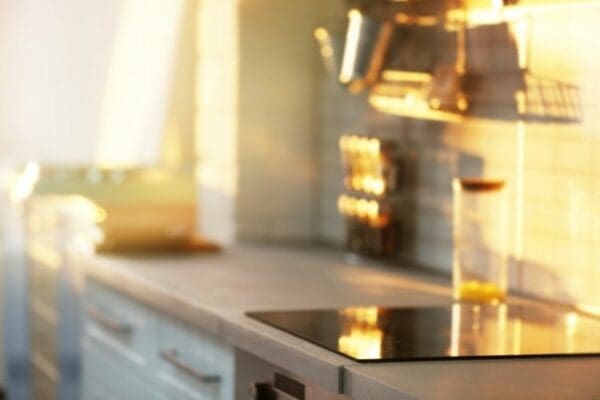
Sunlight or UV resistance determines which material could survive through the long-term direct sunlight, and so they can be used for outdoor applications. Also, discolor resistance stems from sunlight resistance, which may challenge outdoor applications.
Laminate: Being exposed to the sun turn them to rot or warp
While the laminate countertop is protected from the sun and moisture, it can stand for a long time, although, being outdoors will cause laminate counters to rot or warp.
Wood: Relatively UV-resistant using special sealing oils
If you seal your wooden countertop with specialized oils, it can turn into water-resistant and UV-resistant, and at the same time, protect the vivid colors of your wood countertop.
Marble & Granite: Has sunlight resistant for a while, but not recommended for outdoor usage
Even though marble and granite are natural stones, it is not recommended for outdoor use. Granite can resist ultraviolet radiation of sunlight for a while, but over time with exposure, granite and marble will begin to fade. Sunlight, also rain, and wind will wear and tear the marble and granite surface.
Quartz: Sunlight resistant for short time, not recommended for outdoor
If quartz has been exposed to direct sunlight, its color becomes darker and more fainted over time. So in outdoor applications, or for an outdoor kitchen, you may want to remove quartz from the options you are going to select.
Even if your kitchen countertop is exposed to direct light through a window, it is better to reconsider choosing this for the indoor kitchen countertop of your home, because over time the quartz color can fade away.
Porcelain: Highly resistent in direct and prolonged exposure to sunlight
Porcelain tiles can stand up to constant exposure to sunlight and ultraviolet rays, which turns them into a fantastic product for an outdoor application like an outdoor kitchen countertop.
In direct and prolonged exposure to sunlight, porcelain countertops won’t discolor and feel free to use porcelain if you want to design your kitchen layout in some ways where the countertop is exposed to the windows.
Thickness and Relative Weight
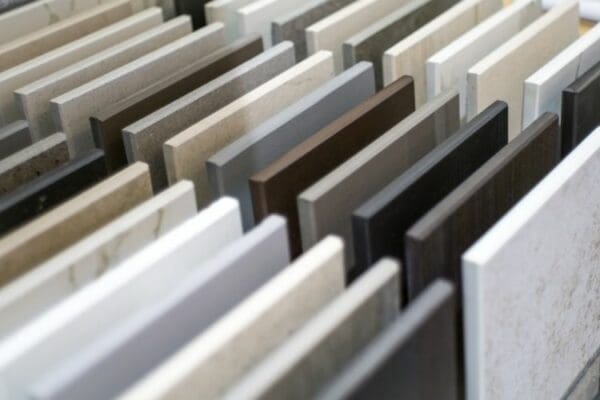
How much material has more thinness and lighter, despite its hardness and durability, the faster and safer it can be transport, the easier it can be installed, and the more likely it is usable for a variety of applications. For instance, 6mm-thickness type of porcelain slabs is an appropriate material for walls, due to their thinness and lightness.
Marble & Granite: Heavy to carry and install
In terms of heaviness and thickness, Marble and granite are almost the same. Granite slabs are usually heavy, and it makes their transportation and installation more challenging. Even carrying a granite countertop from the front door of your house to your kitchen is a difficult task.
Marble weighs around 17 pounds per square foot for a 3cm-thickness slab. So, a 30-square-foot countertop would weigh about 510 pounds. Therefore, Marble countertops are considered heavy and require several people to carry them to your kitchen.
Quartz: Heavy to carry and install
Because of the heaviness of quartz, ranging from 20-25 pounds per square foot, like granite and marble, installation of quartz is a heavy-duty mission.
Due to the heavyweight of quartz, it is very difficult to move and keep in an unbalanced position for installation, especially for wall and countertop installation, so it usually requires several people or advanced tools to install.
Plus, installers need to ensure the foundation is secure and strong enough to handle the mass of the quartz. Although the 2cm-thickness types of quartz are relatively heavy, the 3cm-thickness types can be considered super heavy which is one of the main reasons for the declining trend of 3cm-thickness popularity in recent years.
Laminate: Easily installed due to its lightweight
Because of its lightweight nature as opposed to heavy granite, marble, and quartz countertops, laminate countertops can easily be installed without the help of many people.
Wood: Lighter than stone, but thicker
Although wood in nature is much lighter than stone, usually wood countertops have more thickness compared to other materials, ranging from 2 inches to 6 inches. Therefore, the total weight of a wood countertop ready for installation is not much lighter than stone countertops, normally it would weigh about 200 pounds.
Porcelain: less required thickness due to a higher hardness than quartz, leads to less weight
Because of the Porcelain countertop’s strength due to its hardness, it does not need to be made of 2cm thickness similar to Quartz slabs, and only 12 mm thickness is enough to perform its lifelong duty into your home as your porcelain countertop. As a result, less thickness leads to less weight, easier handling and installation, and less cost. All in one shot, one porcelain countertop.
Conclusion
Earlier evaluations discussed can be seen in summary through the below table:

As you can see, although, almost all the discussed materials have a relative quality in the studied characteristics, as to conclusion, it can be clearly seen that Porcelain Slab or Porcelain Countertop check a lot of boxes and has the most advantages, followed by Quartz and Granite Stone. Of course, we will continue our comparisons in other features and categories in the following articles, to achieve a comprehensive unbiased outlook. But for now, we can say that the porcelain countertop is the best in terms of materials’ inherent quality because it has the best Hardness & durability, Non-Porous Surface, Heat Resistance, and UV Resistance. And although it is not the best in terms of relative Thickness & weight, still gets better points than quartz and granite.
